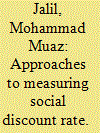| Srl | Item |
| 1 |
ID:
122208


|
|
|
| 2 |
ID:
110693


|
|
|
|
|
| Publication |
2011.
|
| Summary/Abstract |
Indoor air pollution from burning solid fuels for cooking is a major environmental health problem in developing countries, predominantly affecting children and women. Traditional household energy practices also contribute to substantial time loss and drudgery among households. While effective interventions exist, levels of investment to date have been very low, in part due to lack of evidence on economic viability. Between 2004 and 2007, different combinations of interventions - improved stoves, smoke hoods and a switch to liquefied petroleum gas - were implemented in poor communities in Nepal, Sudan and Kenya. The impacts were extensively evaluated and provided the basis for a household-level cost-benefit analysis, which essentially followed the methodology proposed by the World Health Organization. The results suggest that interventions are justified on economic grounds with estimated internal rates of return of 19%, 429% and 62% in Nepal, Kenya and Sudan, respectively. Time savings constituted by far the most important benefit followed by fuel cost savings; direct health improvements were a small component of the overall benefit. This paper describes the methodology applied, discusses the findings and highlights the methodological challenges that arise when a global approach is applied to a local programme.
|
|
|
|
|
|
|
|
|
|
|
|
|
|
|
|
| 3 |
ID:
120157


|
|
|
| 4 |
ID:
043144


|
|
|
|
|
| Publication |
London, English Universities Press Ltd., 1971.
|
| Description |
328p.Hbk
|
| Standard Number |
034012461X
|
|
|
|
|
|
|
|
|
|
|
|
Copies: C:1/I:0,R:0,Q:0
Circulation
| Accession# | Call# | Current Location | Status | Policy | Location |
| 007421 | 658.1554/KEN 007421 | Main | On Shelf | General | |
|
|
|
|
| 5 |
ID:
121370


|
|
|
|
|
| Publication |
2013.
|
| Summary/Abstract |
A key challenge internationally is the design of future electricity systems which will bring about emissions savings and fuel security at least cost. Peat is used to generate electricity in several EU countries, mainly to take advantage of indigenous resources and increase fuel mix diversity. The Irish government has introduced a target of 30% cofiring of peat and biomass by 2015. This paper assesses the feasibility of achieving this target by calculating the available indigenous biomass resource capable of being cofired; the cost of meeting the target; the benefits in terms of carbon abatement; and finally the present value in economic terms of meeting the target. Results demonstrate that Ireland has only half the necessary resource to meet the 30% target and that the net cost of doing so is greater than the cost of what is currently being paid for peat, in all of the scenarios considered. Thus, it is concluded that while it may be technically possible to meet the target by combining national resources with imported biomass this is never the least cost option, and as a result the targeted focus of Government policy may need to be reconsidered.
|
|
|
|
|
|
|
|
|
|
|
|
|
|
|
|
| 6 |
ID:
149993


|
|
|
|
|
| Summary/Abstract |
Energy policy and research span multiple objectives, disciplines, methodologies, and data sets. This breadth of research results in conflicting analyses and proposals, which enable various parties to leverage these conflicts to further their vested interests. This paper explores these issues caused by differing research methodologies. It examines a recent proposal to search for common ground regarding contentious energy problems that emphasizes the use of different analytical frames as major sources of disagreement, and a case study regarding a dispute on how to conduct cost-benefit analyses of energy efficiency programs. Resolving differences among the research community and energy analysts requires a collaborative effort of painstaking research and debate. This paper articulates four policy implications. First, energy analysts should not be inexorably bound to their analytical frames. Second, analysts should not encroach on the role of policymakers by being asked to resolve questions that involve tradeoffs among fundamental values. Third, analysts have an important role helping to inform policymakers of the implications and limitations of various types of analyses of energy and environmental issues. Fourth, analysts need to develop a research program that is able to answer particular questions from multiple research frames in order to assess the robustness of their findings.
|
|
|
|
|
|
|
|
|
|
|
|
|
|
|
|